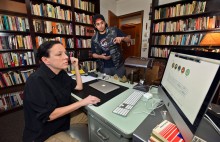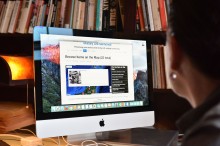Touching base
Currently only 0.4 percent of the U.S. population actively serves in the U.S. armed forces, according to the Department of Defense. So, the general public knows very little about the stories of their daily lives and those of family members and civilians connected to them.
Wheaton College Professor of History Anni Cecil is working to change that with the launch of a new crowdsourced website called Military Life Memories. The website, designed for the general public and researchers, aims to be a permanent collection of stories about the lives of those who serve or have served in the military and their families, as well as civilians who work for the armed forces, and host communities where military bases are located.
Members of the military community are being encouraged to contribute written testimony, photographs, videos, letters and other artifacts documenting their lives. Cecil, supported by funding from Wheaton College and working with research partner Khalifa Al-Ghanim ’18, hopes to build an archive of materials that contributes to the study of post-World War II military life and military communities. Alicia Peaker, the digital scholarship specialist at Bryn Mawr College, is the front-end developer of the website and the project manager.
“My main goal is to collect these stories so that historians and scholars and the public can have access to them. I want it to be a serious collection that’s valuable to historians in the same way that the collections that I’ve used from the 19th and early 20th centuries have been useful to me,” said Cecil, project director and chair of Wheaton’s history department.
Al-Ghanim, a political science major and an administrative contributor to the website, has been working with Cecil since 2015. In summer 2016, he and the professor traveled to Washington, D.C., to conduct interviews with veterans, and he will help teach Wheaton students how to collect oral histories.
“While my current coursework is very focused on macro-level events, this project gives me insight into the effect that the military has on individuals and their families at a micro and more personal level,” Al-Ghanim said. “My career plans include seeking a job with the Kuwaiti Ministry of Foreign Affairs, so my work on this project will help because of the public relations skills I’ve gained while gathering oral histories and communicating with members of the U.S. military community.”
Though it has an academic purpose, Cecil sees the website as a useful resource for others as well.
“We’re sending soldiers out to do tasks that the rest of Americans don’t want to do. And we want to support the troops and stand at the ballgames when soldiers come on the field, but most of us, in fact, have very little idea what military life is like—either for the soldiers or for their families. That is not the way that it should be,” she said.
The professor is part of the military community. She is married to a retired member of the Air Force and did office work on military bases in Germany as a civilian from age 18, before going to graduate school.
“The world of military communities is closed-off and kind of mysterious for most people. When there was a draft there was a sort of cross-section of American society. Today fewer people know anyone in the military,” she said. “I think it behooves us all to learn as much as we can about people whose lives are very different from ours, but with whom we share citizenship.”
The professor teaches courses on European and U.S. military history. The new website also eventually will serve as the basis of one of Cecil’s history courses, which will provide an opportunity for students to maintain and improve the website and create exhibits using materials in the database.
Cecil’s research and publications have examined several facets of the history of military communities, including changes in host military base relations overseas, the historical development of military benefits, and lifestyle services.
“The history of the military subculture gives us valuable insight into the role of the U.S. armed forces as it spearheaded the expansion of U.S. power across the world,” the professor noted.
“I find the subculture very comforting and interesting. The mobility and the flexibility is something I feel a lot more comfortable with. People in the military, and a lot of spouses as well, are shaped, in terms of their identity, by being a part of this community. You have very little control over where you get sent. You have very little control over what house you live in. But at the same time, you do your best to exert control over that. So people in the military community tend to be—if they’re successful and happy in it—very flexible, very adaptable,” she said.
Cecil’s publications include Life in the U.S. Armed Forces: (Not) Just Another Job (Praeger, 2008); U.S. Soldiers Overseas: The Global Military Presence (Praeger, 2004); and Wiesbaden and the Americans, 1945–2003 (Wiesbaden StadtArchiv Verlag, 2003).
Currently, Cecil is writing a book about Army wives living and traveling on the western frontier of the U.S. and in the Pacific between the Civil War and World War II. In fact, the work on that book builds off of research for her dissertation and sparked the idea that eventually led to the website.
Cecil’s dissertation director gave her a collection of letters from Army officers’ wives from the 19th and 20th century. Cecil recognized the value of this kind of primary source of information and that not much of it is widely available beyond this time period.
“And now, with digital humanities becoming a growing field of collecting historical material and then figuring out various ways to use it, I’ve been inspired to pursue this project. Kathryn Tomasek [associate professor of history] is a pioneer in this, and she also has inspired me to think about this approach with using the website.”


